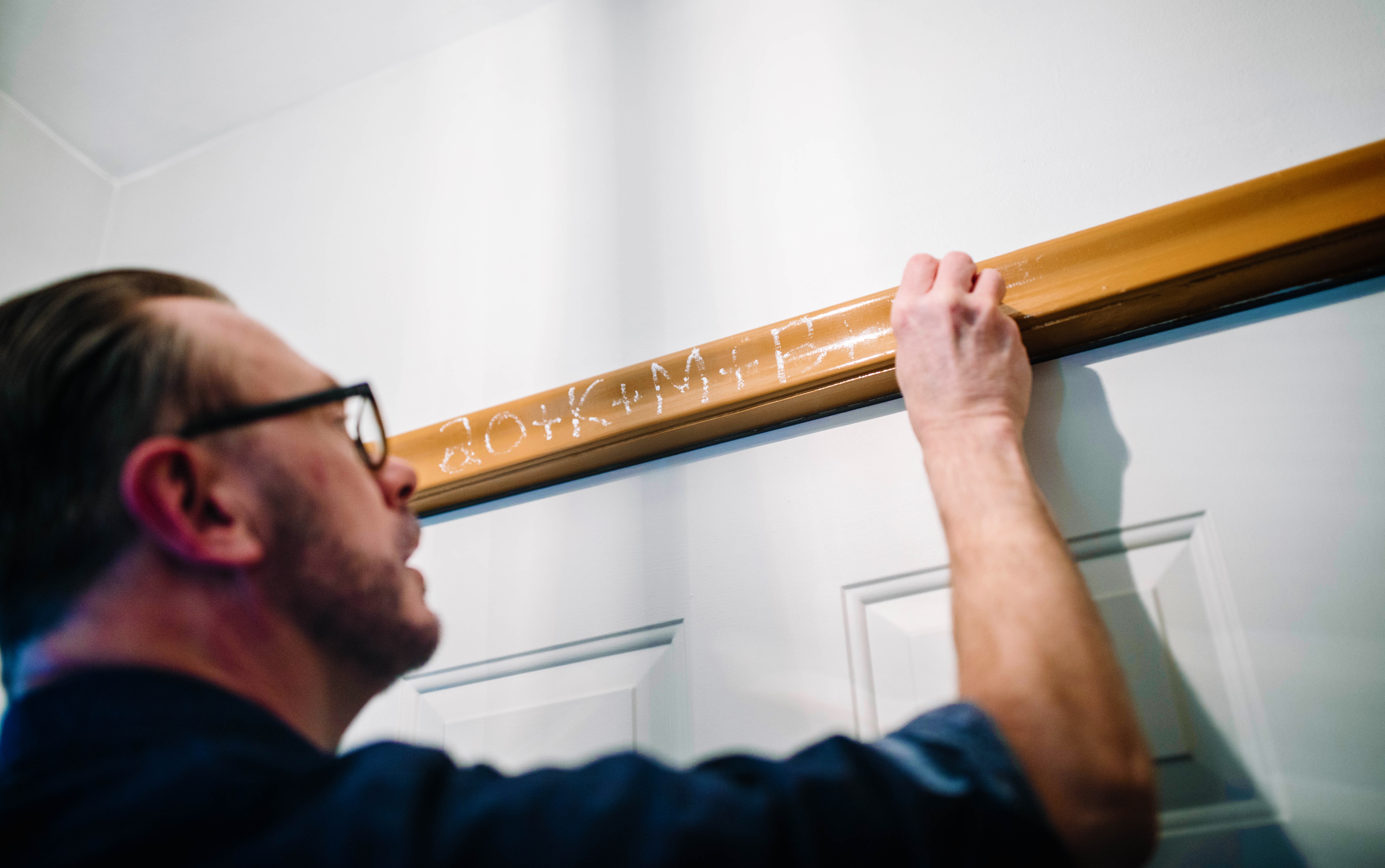Initials written in chalk symbolize names, gifts of the Wise Men as Catholics bless homes in 2019
WARREN — Mike Smigielski marks the new year by literally marking his home.
After Sunday Mass at St. Hyacinth Parish in Detroit, Smigielski marked the top doorpost of his Warren home with chalk, writing “20 + K + M + B + 19” in celebration of the Epiphany.
Catholics marking their homes with chalk for the Epiphany is a tradition that dates back centuries, signifying their homes are homes where Christ lives.
Usually, families gather around the front door of the home, saying a prayer before a family member makes a mark on the doorpost or front of the home. The family member than passes the chalk to another member of the family to make the next mark.

Mike Smigielski said the markings on his doorpost serve as a reminder to all guests that his home is a home where Christ resides.
“I’ve been doing it since I was old enough to do it as a kid,” Smigielski told Detroit Catholic. “Our family didn’t really do much of a gathering around the door. So we just did it all at once. My grandma lived in Detroit in a house with a giant porch with really dark molding, so the chalk stood out.
“As a child growing up, you would see the chalk on the door and see that this was a Christ-centered home,” Smigielski said, recalling his grandmother’s house.
Fr. Philip Ching, pastor of St. Michael Parish in Monroe, explains the blessing of the chalk and marking of the doors is a way for Catholics to pray for protection of their homes for the year.
The traditional markings of “CMB” refer to the names of the three Wise Men who visited the Holy Family at the Nativity — whom tradition identifies as Caspar, Melchior and Balthasar — who gifted the infant Jesus with gold, frankincense and myrrh. (Smigielski's family uses a "K" instead of "C" for the Polish spelling of Kaspar.)
“CMB” is also an abbreviation of the Latin phrase Christus mansionem benedicat, which translates to “May Christ bless this home.” The numbers preceding and following symbolize the year, with crosses in between.
“The blessing of the chalk has been a practice for quite some time,” Fr. Ching said. “With the blessing of the chalk, parishioners are asking for the Lord to bless their homes and all the inhabitants of the home throughout the year.”
The chalk is usually blessed either before Mass or right after the intentions of the faithful are read. Fr. Ching said he and the parish staff will be chalking the doors of the parish office Monday and on the parish school building once classes resume.
“You’re supposed to chalk the doors as soon as possible after the Epiphany,” Fr. Ching said. “We’re providing a sheet of paper with instructions to follow and prayers the family can recite. Chalking the doors draws similarities with the celebration of the Feast of Passover, when the Israelites were instructed to put blood on the door posts.”

Fr. Janusz Iwan blesses envelopes filled with chalk and incense to be disturbed to parishioners at St. Hyacinth during the weekend Epiphany Masses. St. Hyacinth distributes chalk and instructions on how to mark one’s home with the traditional markings for the Epiphany tradition.
Smigielski and the rest of the St. Hyacinth parishioners received a small envelope with chalk and incense they can burn in their homes.
“I pray a prayer over the home, wipe away the previous year’s chalk, bless the door with holy water and make the new marking,” Smigielski said. “I take solace in knowing I’m starting the new year off right, asking for God’s blessing. It’s comforting knowing your home is overshadowed by the Lord’s presence.”
Fr. Anthony Camilleri, associate pastor of St. Michael the Archangel Parish in Livonia, said the chalking of the door is a great way for families, especially young families, to recognize their homes as the domestic church.
“The first time I heard of chalking the doors was when I was in seminary, and we’d mark the outside doors and the doors to the chapel,” Fr. Camilleri said. “I took this idea to the parish when I was first ordained, using the blessing as a way of putting Christ and the faith in the home.”
Fr. Camilleri added the Epiphany is an appropriate date to bring Christ’s gifts into the home, as it is a celebration of the Magi bringing gifts to Christ.
“In other countries, the Epiphany is the day people exchange gifts, so the marking of the chalk stems from the tradition of the Wise Men exchanging gifts on the Epiphany,” Fr. Camilleri said. “As the Wise Men brought gifts to Christ’s home, Catholics are bringing Christ into their homes, so all who are welcomed to our homes receive Christ.”
Smigielski sees the chalking and blessing of his home as a small way for his family to proclaim Christ in the world, a sign to all who come through his door that his home is a home for Christ.
“This is just another example of the importance of outward signs of the faith,” Smigielski said. “In our growing secular world, we need to see outward signs of our Christian faith, that as Christians, we’re not afraid to proclaim our faith or share the Gospel. Chalking my door is an invitation to speak to others about Christ and His Church.”










